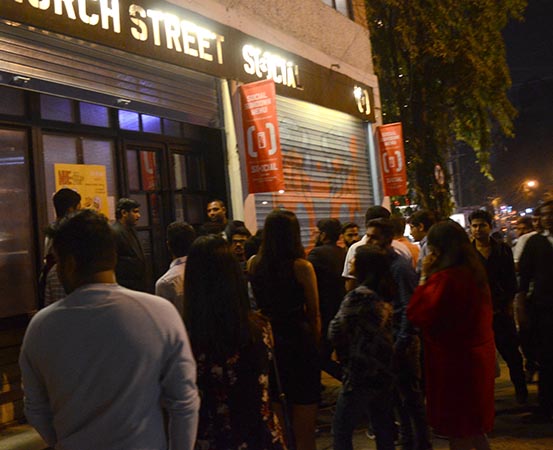
I got you, moonlight, you’re my starlight.
I need you all night, come on, dance with me.
Levitating, a popular song by British-Albanian singer Dua Lipa played on loop at 1 am at a club in Bengaluru where hundreds rocked the dance floor. The club closed for the night soon enough, but the nightlife did not end. While some drove to the hills to catch the sunrise, others went for a late-night dinner and to tuck into the popular Elvis Presley ice cream to satisfy their night cravings. Most of them headed home only at dawn.
The Happiest Health team took a stroll through Bengaluru to hear from the night revellers how partying through the night affected their sleep. Some said sleep was not on their menu. But there were others who comprehended the importance of sleep the hard way.
“I would go to clubs and pubs every weekend and sleep only after I returned home. I would have my dance classes packed the next day, and resting was next to impossible,” said Harsh Dhanuka (26), a dance teacher and finance manager. “I was sleep deprived, and if I had alcohol the previous night, the hangover would drain me out. I had difficulty focusing on work and had the urge to take naps. I had no motivation and energy to work out. I also started stress eating.”
He said the effects of the lack of sleep gradually started becoming more apparent and thus, he made a conscious effort to change his habits.
Another partygoer, Renuka Neelagandam (30), a communication specialist from Bengaluru said that sleeping late after partying started affecting her work. “After partying, I used to find it difficult to wake up in the morning and go for a walk because of the hangover. I was struggling to sleep and was sleep deprived. The metabolism that I had in my early 20s had reduced which made me cut down on partying,” she said, adding that she now has a disciplined sleep routine.
Loss of sleep disrupts sleep health
“Losing sleep will disrupt the sleep cycle and cause a temporary [change of its] architecture. The circadian rhythm gets disrupted and disturbed. Lack of sleep also leads to a situation of sleep debt. Sleep debt cannot be repaid by sleeping the next day for some additional hours,” said Dr Satyanarayana Mysore, HOD, Pulmonology and Sleep, Manipal Hospital, Bengaluru.
He added, “There will be a lot of changes in the REM stage of sleep (dream stage). The dream state will forcibly encroach on the non-REM sleep stages – you will get more dreams than before and sleep will be disturbed.”
Sleep deprivation may also lead to a situation called sleep pressure – the irresistible urge to fall asleep the next day. However, the pattern continues very frequently, and this situation may change into a chronic condition called delayed phased syndrome, pointed out Dr Mysore. “When people try to catch up on sleep perpetually, this chronicity can lead to an advanced sleep phase. So, late-night engagements and partying can lead to a huge number of disruptions in sleep health and overall well-being.”
Binge eating, late-night snacking and alcohol form a cocktail for disasters. It could cause Monday blues – a feeling of dread starting the week. One may be low on energy, find it difficult to wake up and feel sad.
High-stress jobs get affected due to sleepless nights
Arushi Prakash (22), a journalist with a leading newspaper in India used to party every night. Her reason for partying and late-night outs was the overwhelming work pressure and deadlines that she had to tackle during the day. “I wanted to have some fun at the end of the day after spending my day working on my copies which most often is stressful. My sleeping pattern was not right. I used to return home at 2 am and go to bed only at dawn. And then I used to go hunting for stories as early as 9 am,” she said.
“I used to sleep frequently during the day. The hangover was affecting my work and I could not focus on my copies. Now, I have cut down on my alcohol intake. I get back home early and get proper sleep,” she added.
Occasional late nights are manageable
Dr Vivek Anand Padegal, HOD, sleep medicine, Fortis Hospital, Bengaluru, said that pulling an all-nighter occasionally is fine. But when it becomes perpetual, it can start impairing daytime functioning.
“There are factors like sleep deprivation and mood hypertension (mood swings) that happen when you do not get enough sleep. How do we overcome this? The first thing is to sleep,” he said. Catching up on sleep the next day can help manage one’s daily tasks, but it is not proper sleep because it is not fully restorative, he added.
Youngsters need to sleep well for their academic performance
Apart from going out at night, being on gadgets in the night can also lead to sleep loss, said Dr Rajaram G, consultant pediatrician, Rainbow Children’s Hospital, Bengaluru. And this can particularly affect students, he noted.
“This loss of sleep affects blood pressure and blood sugar levels. It can cause mood disturbances and affect academic performance,” he said, stressing that young people need to make sure they have a regular sleep schedule even during their school/college breaks.
Takeaways
Losing sleep will disrupt the sleep cycle and cause a temporary change in its architecture. Pulling an all-nighter occasionally is fine. But when it becomes perpetual, it can start impairing daytime functioning.

















